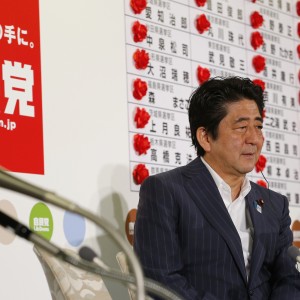TOKYO, Japan – Japan’s economy sank into a recession as the economy contracted in the July-September quarter, official data showed Monday, making it almost inevitable that Prime Minister Shinzo Abe will delay a sales tax hike and call snap elections.
The country’s gross domestic product shrank 0.4 percent, or at an annualized rate of 1.6 percent, underscoring how an April tax rise dented growth and dealing a huge blow to Abe’s bid to turn the world’s number three economy around.
The surprise figure missed market median expectations for a 0.5 percent expansion, according to economists surveyed by the leading Nikkei business daily, as residential investment dived, capital spending was weak, and consumer spending remained tepid.
The data increases the likelihood that Abe – who is expected to call a snap election for next month – will delay a plan to boost Japan’s sales tax to 10 percent next year.
A rise to 8.0 percent from 5.0 percent earlier this year slammed the brakes on growth.
The country suffered a revised 1.9 percent contraction in the April-June quarter – or 7.3 percent at an annualized rate – as consumers and firms capped their spending.
That reversed a 1.6 percent expansion in the first quarter of the year when hopes were still buoyant for Abe’s growth bid, dubbed “Abenomics”.
Last month, the Bank of Japan expanded its already huge monetary easing campaign to counter the downturn, but the latest figures will also hike speculation of further moves by the central bank.
Snap election ‘likely’
Tokyo has said it would wait to see the final estimate for third-quarter GDP, scheduled to be released in December, before making a final decision on the second tax hike.
But “domestic demand barely rose last quarter”, Marcel Thieliant from Capital Economics said in a report following the data release.
“In light of the sharp fall in today’s preliminary estimate, it now looks likely that PM Abe will call off the hike and announce snap elections,” Thieliant said.
The tax rises are aimed at paying down Japan’s enormous national debt, but they have put Abe in a tricky position as he tries to balance them with his pro-spending growth plan.
Since his late 2012 election, Abe’s plan to conquer years of deflation that have held back growth in the once world-beating economy has been bearing fruit.
While most commentators said a dip in spending was inevitable after the rise – millions of shoppers dashed to stores ahead of the tax hike – the second-quarter contraction was much more painful than many economists had expected.
Monday’s data was a crucial measure of the state of Japan’s economy as Abe mulled the scheduled second tax increase – written into law and due to take effect in October 2015 – amid fears that it would snuff out a recovery altogether.
Japanese media have reported that Abe plans to hold snap elections on December 14, two years ahead of schedule, as he seeks to bolster his public support on the back of shaky approval ratings.
The premier wanted an early election while opposition parties remain weak after the ruling party’s spectacular election victory two years ago, pundits said.
The Mainichi newspaper said the conservative premier would order the drafting of an additional budget on Tuesday, before announcing his decision to dissolve the lower house of parliament.
